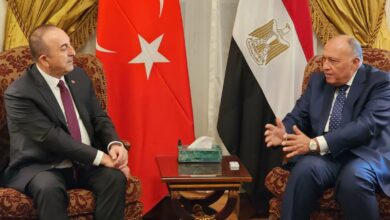Conflicting news about the whereabouts of Muammar Qadhafi as rebels stormed his fortress-like compound in Tripoli occupy the front pages of most newspapers. Tuesday witnessed day-long battles between the rebels and Qadhafi loyalists.
“The most important thing in the coming period is for Qadhafi to be arrested and tried,” Libyan political analyst Abdel Moneim al-Hor tells privately owned Egyptian newspaper Al-Shorouk, warning that if the Libyan leader manages to flee abroad, he will work for the rest of his life on destabilizing the nation.
State-run Al-Ahram writes about US concerns over post-Qadhafi Libya, citing statements made by the chairman of the House Select Intelligence Committee and strong supporter of US/NATO mission in Libya, Mike Rogers, saying “As the Qadhafi regime crumbles, the US must turn its attention to ensuring that Qadhafi’s weapons stockpile does not fall into the wrong hands.”
Rising tensions between Egypt and Israel since six Egyptian officers were killed as a result of an Israeli border raid Thursday remain the main staple of local newspapers for the sixth day in a row.
Privately owned Al-Tahrir leads with the headline “Israel vaunts,” citing the statements made by Israeli Defense Minister Ehud Barak on Monday in an interview with Israel's Channel 2 News as he denied apologizing to Egypt for the soldiers’ deaths.
"I didn't apologize to Egypt, I expressed regret," Barak said, a reaction that Al-Tahrir relates to the weak and confused official position of Egypt.
Despite a continuing sit-in in front of the Israeli Embassy, the ruling military council has not reiterated Egyptian demands for a formal apology or recalled the Egyptian ambassador to Tel Aviv as it initially said it would do. No official statements have been made in relation to other protester demands, including permanently stopping natural gas exports and terminating relations with Israel.
The official statement made by the cabinet in light of its meeting on Monday that it would await the results of the joint Egyptian-Israeli investigation into the killings and establish a company to develop the Sinai Peninsula were severely criticized by Al-Wafd Editor-in-Chief Suleiman Gouda in his column. The leftist party paper leads with the column’s headline “Mubarak still rules!” Gouda argues that investigations into the incident will never be completed and that the cabinet “can wait forever.” He also criticized the decision to establish the company, citing a similar venture undertaken by the Mubarak regime only to be dissolved a few years later.
“This reflects how Sinai continues to be viewed as a non-integral part of Egypt,” he writes.
In relation to Mubarak, Al-Wafd also runs a short news piece about the toppled president writing a 20-page will, asking to have a proper funeral and to be buried next to his grandson, who passed away in 2009 due to health problems.
Protests at the Israeli Embassy, however, seem undeterred despite Ramadan fasting, the heat and clashes with street sellers on Tuesday morning. Al-Tahrir newspaper compares the violence to similar fights that Tahrir protesters witnessed over the past few months, emphasizing that military troops also did not intervene in this situation.
But despite public pressure, jeopardizing relations with the Israeli state carries plenty of complications. Al-Tahrir cites statements US Rep. Kay Granger, who is chairwoman of the House Appropriations Foreign Operations Subcommittee, made to the Jerusalem Post, warning that “Washington’s $2 billion in annual aid to Egypt will be cut off if Cairo backs out of the peace treaty with Israel.”
Al-Ahram refrains from discussing the tensions in detail, but announces an official and popular conference scheduled for Thursday at the People's Assembly downtown to determine the Egyptian position regarding Israel. More than 300 political figures representing various groups are expected to attend.
The Egyptian military seems to be taking some precautionary measures in light of the recent attacks. Al-Shorouk reports that the military is currently mapping underground tunnels used for smuggling goods and people between Gaza and the Sinai Peninsula and plans to destroy them, in addition to tightening security measures at the border.
On a more local level and in light of the upcoming parliamentary elections, Ibrahim Eissa, editor-in-chief of Al-Tahrir, expressed his concerns in a column titled “Elections forged by the people.” Eissa anticipates chaos, noting that the voting districts have not yet been announced and that combining the list-based candidacy and single-winner system, with each method accounting for half the seats, adds to the complexity and potential confusion.
“This process is so complex that neither of the great mathematicians Khwarizmi nor Pythagoras can handle it,” he writes sarcastically. Eissa also relates potential chaos to the security void and high illiteracy rates among Egyptian voters, saying, “The upcoming elections would not be forged by the state but rather by the people.”
Privately owned Youm7 publishes the results of a new survey by Al-Ahram Center for Strategic and Political Studies that reports 95 percent of the sample trusts the Supreme Council of the Armed Forces (SCAF) will hold parliamentary elections on time. Among state institutions, 80 percent of the sample chose the military as the most important in Egypt, followed by the judiciary at 60 percent.
Youm7 also leads with an exclusive story about the military preparing to stop trying civilians in military courts. The SCAF has requested some activists to submit lists of the names of civilians who were tried in military courts for possible release, writes Youm7. Mamdouh Hamza, head of the National Council, is also asking Field Marshal Hussein Tantawi to release detainees arrested for breaking curfew or suspicion to mark the occasion of Bairam, the holiday after Ramadan.
Egypt's papers:
Al-Ahram: Daily, state-run, largest distribution in Egypt
Al-Akhbar: Daily, state-run, second to Al-Ahram in institutional size
Al-Gomhurriya: Daily, state-run
Rose al-Youssef: Daily, state-run
Al-Dostour: Daily, privately owned
Al-Shorouk: Daily, privately owned
Al-Wafd: Daily, published by the liberal Wafd Party
Youm7: Daily, privately owned
Al-Tahrir: Daily, privately owned
Sawt al-Umma: Weekly, privately owned
Al-Arabi: Weekly, published by the Arab Nasserist party




